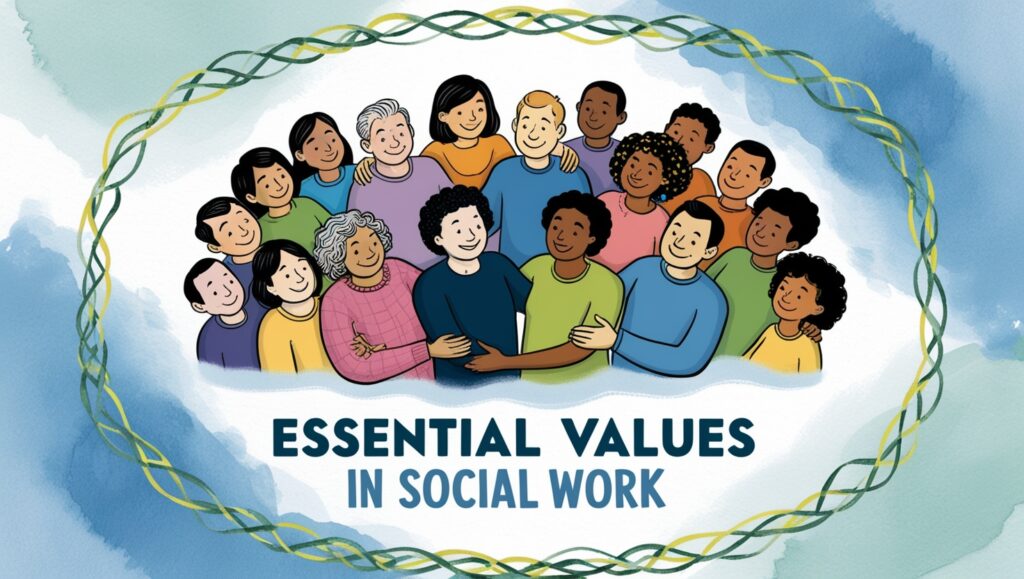Social work values, as such, have to play a significant role in social work practice as they maintain social equilibrium, unity in behavior, psychological foundation of life, determination of role, and evaluation of social events and problems.
Social Work Values by Social Scientists
Some of the famous social work scientists have enumerated some important values involved in the professional practice of social work; those can be stated under the following points:
Friedlander, a renowned social work scientist, has enumerated four primary values of social work, such as:
- Conviction of the inherent worth, integrity, and dignity of an individual
- The right to determine himself, what his needs are, and how they should be met
- Strong belief in the principle of equal opportunity for all, subject only to an individual’s capabilities.
- Social responsibility towards himself, his family, and his community.
G. Konopka has enumerated two primary values of social work, namely:
- Respect for every person and the right of each person to the fullest development of their potential.
- Mutual dependence of individuals and responsibility towards each other according to their abilities.
NASW (2008) presented six core values that include:
- Service: Providing help, resources, and benefits so people can achieve their maximum potential.
- Social justice: It is essential to imagine a world where everyone enjoys equal rights, protection, opportunities, obligations, and social benefits, irrespective of their backgrounds or affiliations with various groups.
- Dignity and Worth of the Person: Holding high esteem and appreciating individual value.
- Importance of Human Relationships: Recognizing the importance of the reciprocal interactions between social workers and clients, including the ways in which they express themselves, perceive one another, and interact with each other.
- Integrity: Maintaining trustworthiness and sound adherence to moral ideals.
- Competence: Having the necessary skills and abilities to work effectively with clients.
Core Values in Social Work
Dignity of the Individual
Social work believes in the dignity of individuals irrespective of their class, faith, and caste. It’s because, on the one hand, individual units make up society, and, on the other hand, society is the foundation upon which individuals exist. Thus, both society and individuals are interdependent and determine each other’s existence. Owing to this significant relationship, social workers prefer individual dignity, even in adverse circumstances.
Individual Freedom
Social work recognizes individual freedom and his creative ability to solve the problems that confront him. In other words, an individual is free to select means and methods in accordance with his problem. The principal aim of individual assistance is to develop his creative abilities so that, in the future, he may be able to solve problems without the assistance of others.
Multiplicity of Causes
Social work assumes the diversity of factors involved in the causation of a problem. For example, there are many causes of juvenile delinquency, viz. poverty, immorality at home, broken homes, bad company, and criminal parents. Therefore, before assisting a client, the social worker should study all the factors connected with the problem.
Collective Responsibility
Social work promotes the well-being of individuals in harmony with the community’s needs. In social work, individual welfare cannot be separated from public welfare. Both aspects are interlinked. However, it is not possible to solve individual problems so long as social problems remain unsolved.
In this regard, the entire community must bear the burden of responsibility. Therefore, social work is based on the assumption that the state should furnish welfare services to its members. In short, it should not only enhance the happiness of any individual or group, but it should also help create conditions that help satisfy a way of life.
The key feature of a welfare state is the collective responsibility taken on by the community, through the state, to ensure that every individual has access to the necessities for health, economic stability, and a dignified life while also enabling participation in the shared cultural and social heritage according to one’s abilities.
Democratic Values
Social work practice believes in democratic values. It is in the background of the philosophy of social justice, equality, and fraternity that its practitioners have developed social work methods. It is oriented to the “well-being’ of everyone and marks the acceptance of human conservation as the basic democratic task. It differs from the welfare state’s aura of charity and philanthropy.
Social Justice
Social work believes in distributive justice. It believes in dividing the fruits of social development among all according to their capacities and aspirations. It also emphasizes helping the unprivileged to face the challenges of their lives. Since the equal integrity of each person is accepted, it is considered society’s duty to provide equality for each person’s pursuit of happiness.
This view favors the equalization of income for all persons. Social work regards human liberty and treats people as ends in themselves, not as a means to an end.

Social Development
Social work believes not only in solving the problems of individuals but also in social development. It involves structural changes that allow citizens to participate in new economic, social, and political roles. Participation in this sense means “participation in every dimension of life, culture, economy, educational system, political system, and decision-making process. It means full empowerment concerning the totality of society’s activities.”
A Social Development Model for Social Work intervention strategies related to each social development system, which includes social investment, economic participation, political empowerment, and human investment, is set out in the boxes corresponding to each sector. The model extends the traditional approach to social work by including sustainable development strategies for each system sector.
Modernization
Social work believes in modernization and coping with changing situations. Karl Deutsch (1961) referred to the socio-demographic aspects of modernization as “social mobilization.” He referred to social mobilization as “the process in which significant groups of prevalent social, economic, and psychological commitments are dismantled, allowing individuals to be open to new patterns of socialization and behavior.”
Conclusion
The philosophy of social work is, thus, both humanitarian and scientific. It has the twin aims of building up a healthy, humane personality on the one hand and creating a sane social order based on social justice on the other. An ongoing task for social workers is to identify their values and distinguish between those and their professional values. As you now know, clients’ right to self-determination is a key principle in social work.
Therefore, social workers must be careful not to impose personal values on clients. The mission focuses on improving human well-being and addressing the fundamental needs of everyone, especially prioritizing the needs and empowerment of those who are vulnerable, marginalized, and experiencing poverty.






